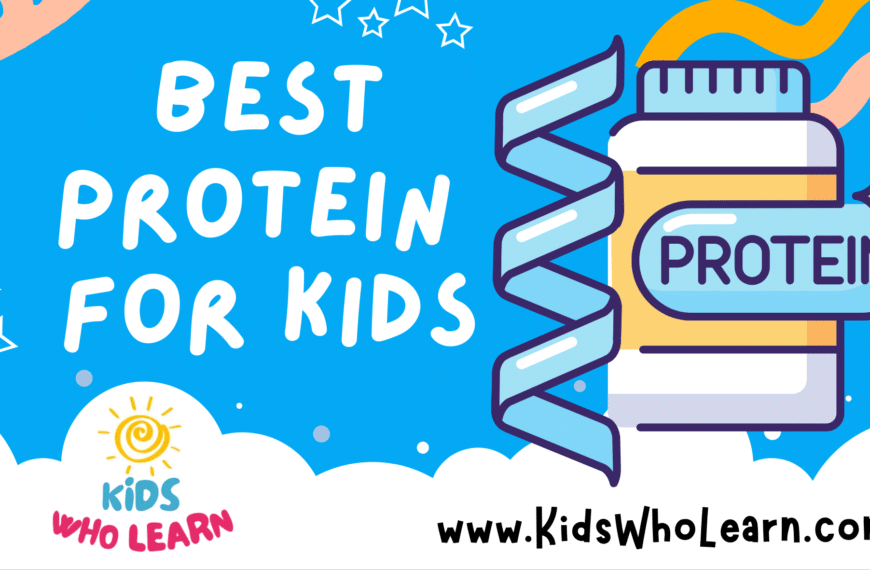As parents, we constantly seek the best for our children’s health and development. Ensuring they receive the proper nutrients is a pivotal aspect of this quest. Vitamins play a significant role in children’s growth, supporting everything from bone strength to immune function. While a balanced diet is the cornerstone of good nutrition, natural vitamin supplements can help fill any gaps and support a child’s diet, ensuring they receive the essential nutrients they need for healthy development.
Selecting the right vitamins for children can be overwhelming with the multitude of options available. It is crucial to understand what vitamins and minerals are vital for your child’s age and stage of development. Safety and quality are paramount when choosing supplements, as is considering the role of whole foods in providing these nutrients naturally. A knowledge-based approach is key in making informed decisions about children’s nutrition, allowing parents to supplement with confidence when necessary.
Key Takeaways
- A balanced diet is fundamental, but supplements can help ensure children get all necessary nutrients.
- Choosing high-quality and age-appropriate vitamins is vital for children’s safety and health.
- Whole foods are the primary source of vitamins, with supplements serving to fill dietary gaps.
Understanding Vitamins and Nutrition for Kids
We need to focus on the specific roles of vitamins and minerals in children’s growth and how these tie into their overall nutritional needs. A well-balanced diet rich in fruits, vegetables, grains, and dairy is crucial for their development.
Vitamins and Their Functions
Vitamins are organic compounds that are crucial for various bodily functions. Here’s a breakdown of some essential vitamins and their specific roles:
- Vitamin A: Important for good vision and a strong immune system.
- Vitamin B Complex: Assists in energy production from food.
- Vitamin C: Essential for healthy skin, teeth, and bones; assists in iron absorption.
- Vitamin D: Vital for calcium absorption for healthy bone growth.
- Vitamin E: Acts as an antioxidant and supports the immune system.
- Vitamin K: Needed for blood clotting and bone health.
Minerals and Growth Requirements
Children require minerals for their growth and development. Key minerals include:
- Calcium: Essential for strong bones and teeth.
- Iron: Necessary for making hemoglobin, which carries oxygen in the blood.
- Magnesium: Important for muscle and nerve function, as well as energy production.
- Zinc: Involved in immune function, growth, and development.
Nutritional Needs and Balanced Diet
Our nutritional needs vary by age and activity level. A balanced diet for kids should include:
- Fruits and Vegetables: Provide vitamins, minerals, and fiber.
- Grains: Preferably whole grains for energy and fiber.
- Proteins: Necessary for building and repairing tissues.
- Dairy Products: A source of calcium and vitamin D.
Portion sizes and variety are key components of a balanced diet for children.
Importance of a Well-Balanced Diet for Children
A well-balanced diet ensures that children receive all the essential nutrients required for their growth and health. This includes:
- Sufficient calories for energy.
- A variety of nutrients from different food groups.
- Avoidance of excessive sugar and saturated fats.
Promoting healthy eating habits early sets the foundation for a lifetime of good health.
Choosing the Right Vitamins for Your Child
Disclaimer: Below is general information, not medical advice. Always talk to your doctor before giving your children anything.
When selecting vitamins for our children, it’s essential to consider the form, ingredients, and nutrient content ensuring the supplement aligns with our child’s health needs and preferences.
Forms of Vitamins: Chewable, Gummy, Liquid
Chewables are often flavored and easy to consume, suitable for kids who can safely chew and swallow. Gummies offer a variety of flavors and can be more appealing to picky eaters, though they may contain added sugars. Liquid vitamins are an alternative for younger children and those who have difficulty with solid forms, providing easy dosage control.
Key Considerations When Selecting Supplements
Our primary focus should be on the quality and efficacy of the vitamins. We must seek out products that are third-party tested to guarantee purity and potency. An understanding of our child’s specific nutritional needs is paramount in choosing a suitable kids multivitamin. Additionally, allergen-free options may be necessary for children with certain dietary restrictions.
Ingredients and Nutrient Content
We should inspect the ingredients list for the presence of essential vitamins and minerals while being mindful of any artificial additives. For families following a plant-based diet, seeking out vegan options is key, and if preferring naturally derived supplements, looking for organic products would be a priority. It is vital to ensure the right balance of nutrients to support a child’s growth and development.
The Role of Pediatricians in Vitamin Choices
We recommend consulting with a pediatrician to help determine our child’s specific nutrient requirements. They can help guide us towards appropriate supplements and may offer brand recommendations known for their quality. Our pediatrician’s advice is also crucial if our child is taking other medications, ensuring there are no potential interactions with new vitamins.
Specific Vitamins and Minerals for Child Development
Understanding the key vitamins and minerals that support child development positions us to make informed choices about our children’s nutrition.
Iron and Its Impact on Children
Iron is essential for children as it plays a critical role in cognitive development and the production of healthy red blood cells. A deficiency in iron can lead to anemia, which is characterized by tiredness and decreased immune function. We must ensure that our children’s diets contain enough iron, which can be found in lean meats, beans, and fortified cereals.
Calcium, Vitamin D, and Strong Bones
Calcium is foundational for the development of strong bones and teeth in children. Paired with Vitamin D, which is vital for calcium absorption, these nutrients work synergistically to promote bone health. Foods rich in calcium include dairy products, leafy greens, and fortified non-dairy milks. Adequate sunlight exposure can help the body produce vitamin D, but additional sources may include fortified foods and supplements.
B Vitamins for Energy and Metabolism
The B vitamins, particularly Vitamin B12, are critical for maintaining energy levels and proper metabolism in children. B12 is important for healthy nerve cells and the production of DNA. Sources of B12 include fish, meat, poultry, eggs, milk, and fortified foods. Other B vitamins like biotin also contribute to energy production and should be included in a balanced diet.
Vitamin A and Vision Health
Vitamin A is renowned for its role in supporting eye health and vision, especially in low-light conditions. Moreover, it aids in the maintenance of healthy skin and immune function. Liver, dairy products, and orange-colored fruits and vegetables are high in vitamin A, which can also be sourced from leafy green vegetables.
Magnesium, Zinc, and Other Vital Minerals
Magnesium and zinc are minerals that are crucial for numerous biological processes. Magnesium contributes to muscle and nerve functions, while zinc is important for immune system support and wound healing. Foods like nuts, seeds, whole grains, and dairy products are excellent sources of magnesium. Zinc can be found in foods such as meat, dairy, and legumes. Together with other essential vitamins and minerals, magnesium and zinc support a robust foundation for child development.
Addressing Common Concerns in Children’s Nutrition
Nutritional concerns such as picky eating, adherence to plant-based diets, iron deficiency, and proper vitamin dosage are common among children. We’ll guide you through addressing these challenges effectively.
Dealing with Picky Eaters and Nutritional Gaps
Picky eaters often resist trying new or varied foods, potentially leading to nutritional gaps. To combat this:
- We introduce a variety of foods in small, manageable portions.
- We encourage a positive mealtime atmosphere, avoiding stress or pressure.
- It’s beneficial to involve kids in meal planning and preparation, enhancing their interest in food.
Vegan and Vegetarian Diets for Kids
Kids on vegan or vegetarian diets can thrive when we ensure they receive all essential nutrients. Key points include:
- We focus on a diverse intake of proteins, such as beans, lentils, and soy products.
- We ensure adequate levels of vitamin B12, either through fortified foods or supplements, a critical consideration for vegan diets.
- We monitor their intake of calcium and vitamin D, which are vital for bone health, supplementing as necessary.
Preventing Iron Deficiency and Anemia
Iron deficiency and anemia can be significant concerns, especially for rapidly growing children. Our approach includes:
- We offer iron-rich foods like fortified cereals, leafy greens, and lean meats.
- For those on plant-based diets, we pair iron-rich plants with vitamin C sources to enhance absorption.
- When needed, iron supplements may be introduced, but only under a healthcare provider’s advice to avoid potential toxicity.
Understanding RDA and Dosage for Children
It’s critical to tailor vitamin and mineral intake to the Recommended Dietary Allowance (RDA) for children, which varies by age and gender. We handle dosage by:
- We strictly adhere to RDA guidelines, ensuring children receive their nutrients primarily through a balanced diet.
- In cases where supplements are necessary, we consult a healthcare professional to determine the appropriate dosage.
- Regular pediatric check-ups help us monitor and adjust dietary intake and supplementation as children grow and their needs change.
Safety and Quality of Kids’ Multivitamins
When choosing multivitamins for children, it’s vital to scrutinize their safety and quality closely. We’ll address common concerns, including potential allergens and artificial ingredients, the importance of regulations and testing, and how to identify trustworthy brands.
Allergens, Additives, and Artificial Ingredients
We often find that many kids’ multivitamins contain various additives, which could include preservatives, colors, and artificial flavors. It’s crucial to opt for products that are labeled as non-GMO and free from common allergens to minimize the risk of adverse reactions. For example, Llama Naturals prides itself on producing organic multivitamins without added sugars or allergens.
- Common Allergens and Additives to Check:
- Preservatives
- Artificial colors
- Artificial flavors
- Added sugars
Regulations and Third-Party Testing
Given that the FDA doesn’t strictly regulate supplements as they do medications, we look for third-party testing to validate purity and potency. Certifications from organizations like NSF or seals of approval from ConsumerLab.com are a gold standard, assuring us of the product’s quality. Ritual and Hiya are examples of brands that meet high-quality standards through rigorous testing.
- Key Quality Indicators include:
- NSF Certified products
- Tests by ConsumerLab.com
Identifying High-Quality Supplement Brands
Our final step in ensuring safety and quality is choosing reputable brands. We prefer those that are transparent about their ingredients and sourcing. High-quality brands like Ritual and Hiya provide detailed information about their ingredients and manufacturing processes. We check for clear labeling and honest marketing to guide us in selecting the best vitamins for kids.
- Traits of Trusted Brands:
- Transparency in labeling
- No misleading information
- Detailed ingredient sourcing information
Supplementing Beyond Vitamins
While vitamins are vital, we also consider other nutrients essential for a child’s well-rounded diet and optimal health. We look at elements like essential fatty acids, probiotics, antioxidants, and fiber, which each play a unique role in a child’s development and wellbeing.
Essential Fatty Acids and Omega-3s
Omega-3 fatty acids are critical for children’s brain development and overall health. We particularly focus on two types:
- Eicosapentaenoic Acid (EPA): Supports cardiovascular health.
- Docosahexaenoic Acid (DHA): Essential for brain and eye development.
Sources include fish oil and algae, which can be found in child-friendly supplements like chewable capsules or liquids.
Probiotics and Digestive Health
Probiotics are beneficial bacteria that support a healthy gut microbiome, crucial for digestive health and a strong immune system.
- Lactobacillus and Bifidobacterium strains are commonly found in children’s probiotics.
- Consider supplements with a variety of strains or fortified foods like yogurt as part of daily intake.
Antioxidants for Immune Support
Antioxidants shield the body’s cells from damage and support the immune system. We particularly recommend:
- Vitamin C: An antioxidant that’s also essential for skin health and iron absorption.
- Vitamin E: Protects cells and supports a healthy immune function.
These can be found in many fruits and vegetables, as well as in specific supplements.
Fiber and Digestive Regularity
Adequate fiber intake is essential for maintaining digestive regularity in children. We suggest:
- Soluble Fiber: This type dissolves in water, can help with nutrient absorption and blood sugar levels.
- Insoluble Fiber: Helps food move through the digestive system and supports regular bowel movements.
Good sources include whole grains, fruits, and vegetables, and can also be augmented with child-friendly fiber supplements.
The Role of Food in Natural Vitamin Intake
We understand that a child’s diet is the foundation of their nutrition, and the right foods can significantly contribute to their daily vitamin needs.
Fortified Foods and Their Benefits
Fortified foods are staples that have essential vitamins and minerals added to them to boost their nutritional content. Milk, for instance, is often fortified with vitamin D, which aids in calcium absorption, vital for children’s bone growth. Breakfast cereals may be fortified with a range of B vitamins that support metabolism and energy. Here’s a brief outline of common fortified foods and benefits they can bring to a child’s diet:
- Milk (vitamin D, calcium) – Enhances bone health and development.
- Cereal (B vitamins, iron, folic acid) – Supports energy production and cognitive development.
- Juice (vitamin C, calcium) – Promotes immune function and bone strength.
Including these in a child’s meal rotation can help bridge any nutritional gaps.
Whole Foods: Fruits, Vegetables, and Grains
The consumption of whole foods like fruits, vegetables, and grains offers a spectrum of vitamins and minerals. By opting for a variety of colorful produce, we provide children with an array of nutrients:
- Fruits (vitamin C, potassium) – Oranges, strawberries, and kiwi furnish vitamin C which is crucial for immune health.
- Vegetables (vitamins A, C, K) – Spinach, carrots, and broccoli are dense in vitamins and promote eye health among other benefits.
- Grains (B vitamins, fiber) – Quinoa, brown rice, and oats contain B vitamins which are essential for energy production and digestion.
Prioritizing organic fruits and veggies ensures that the produce is free from synthetic pesticides and fertilizers, potentially reducing exposure to harmful substances.
Incorporating Iron-Rich and Calcium-Rich Foods
Iron is fundamental for a child’s growth and cognitive development, while calcium is the cornerstone for strong bones and teeth. Here’s how to include them:
- Iron-Rich Foods:
- Meat: Beef and chicken are excellent sources.
- Legumes: Lentils and beans also provide good amounts of iron, especially important for vegetarian diets.
- Leafy Greens: Spinach and Swiss chard contribute to iron intake.
- Calcium-Rich Foods:
- Dairy: Cheese, yogurt, and milk are traditional calcium sources.
- Vegetables: Kale and bok choy are vegetable alternatives rich in calcium.
- Nuts and Seeds: Almonds and sesame seeds can add a calcium boost to any snack.
By thoughtfully selecting foods from these categories, we can ensure that children gain essential vitamins and minerals naturally from their daily meals.
Making Informed Decisions
When selecting natural vitamins for our children, we must prioritize safety and efficacy. Rigorous evaluation of supplement labels and consultation with healthcare professionals ensures that our decisions are well-informed and beneficial for our kids’ health.
Consulting with Pediatricians
When it comes to our children’s health, consulting with a pediatrician is essential. These professionals can guide us in choosing the appropriate vitamins while considering our child’s specific health needs and medical history. The American Academy of Pediatrics (AAP) often reminds us that individualized healthcare is key for optimal growth and development. Pediatricians serve as a valuable resource in determining whether a supplement is necessary and in what dosage.
Reading Labels and Understanding Supplement Facts
It’s crucial for us to read and comprehend the labels on vitamin supplements thoroughly. Supplement facts give us detailed information about the ingredient list, potency per serving, and suggested age range. We must look for any additives or allergens that could be harmful to our children. Ensuring that the product meets the regulatory standards set by authoritative bodies helps us avoid giving our children substandard or unsafe supplements.
Balancing Supplements with Diet
We strive to achieve a balance between supplements and a healthy diet. Vitamins should not replace whole foods but rather complement them. A diet rich in fruits, vegetables, whole grains, and lean proteins can provide most of the nutrients that children need. In cases where our kids’ diet lacks certain nutrients—possibly due to allergies or specific dietary choices—a carefully selected vitamin supplement, as advised by a pediatrician, can be an effective way to fill that gap.
Endnote
In compiling the information about the best natural vitamins for kids, we have aimed to provide a concise and trustworthy resource. Our goal is to empower you with knowledge that can assist in optimizing your child’s nutrition.
Key Takeaways:
- Essential Vitamins: Ensure children receive Vitamin A, Vitamin C, Vitamin D, and Vitamin E.
- Whole Foods: Prioritize whole food sources, such as fruits, vegetables, and grains.
- Supplementation: Use supplements judiciously when dietary intake might be insufficient.
Remember:
- Always consult with a healthcare professional before starting any supplement regimen for your child.
- Monitor dietary sources and maintain a balance to avoid excessive intake.
| Vitamin | Sources | Notes |
|---|---|---|
| A | Carrots, Sweet Potatoes | Supports vision and immune function. |
| C | Oranges, Strawberries | Important for skin and healing wounds. |
| D | Sunlight, Fortified Foods | Critical for bone health and growth. |
| E | Nuts, Spinach | Antioxidant properties protect cells. |
Our exploration of vitamins has aimed to highlight the role they play in a child’s development. By emphasizing the importance of a balanced diet, we trust that we’ve provided a useful guide for making informed decisions about your child’s nutritional needs.
Frequently Asked Questions
In our guide, we address some of the most common questions about vitamins for children to help parents make informed choices about their child’s nutrition.
What essential vitamins should an ideal multivitamin for children contain?
A multivitamin for children should include vitamins A, C, D, E, and a B-complex. These vitamins are crucial for overall growth, immune function, and bone health.
How can I ensure I am choosing a high-quality multivitamin for my 1-year-old?
When selecting a multivitamin for your 1-year-old, look for products that have been third-party tested for purity and potency. Also, opt for brands that specify they are formulated for toddlers.
What are the benefits of organic vitamins for children, and how do they differ from conventional vitamins?
Organic vitamins for children are made from natural food sources and are free from synthetic additives. They can be more easily recognized and utilized by the body compared to some conventional vitamins.
Are there specific vitamins that aid in cognitive development and brain health for children?
For cognitive development and brain health, vitamins B6, B12, D, and E are particularly important in a child’s early growth stages due to their role in nerve function and brain health.
For a 2-year-old, is it better to provide multivitamins in liquid form, and why?
Liquid multivitamins are often preferable for a 2-year-old because they are easier to administer and absorb. Plus, they can be mixed into foods or drinks if necessary.
At what age is it appropriate to start giving children vitamin supplements, and are they necessary for all kids?
Pediatricians typically recommend vitamin supplements when children begin eating solid foods, around 6 months to a year old. Not all children need supplements, particularly if they are getting a balanced diet.












